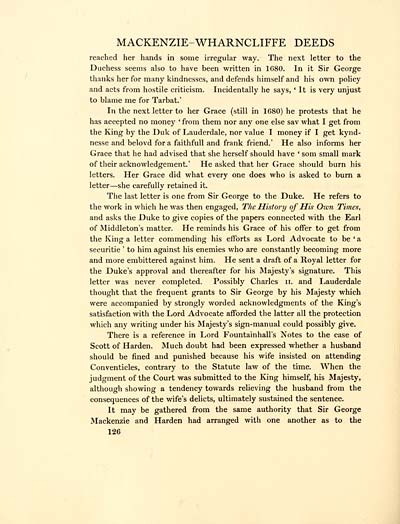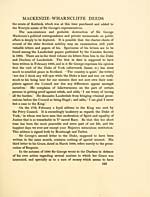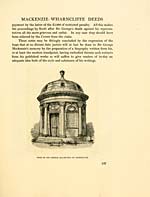Download files
Complete book:
Individual page:
Thumbnail gallery: Grid view | List view

MACKENZIE-WHARNCLIFFE DEEDS
reached her hands in some irregular way. The next letter to the
Duchess seems also to have been written in 1G80. In it Sir George
thanks her for many kindnesses, and defends himself and his own policy
and acts from hostile criticism. Incidentally he says, ' It is very unjust
to blame me for Tarbat.'
In the next letter to her Grace (still in 1680) he protests that he
has accepted no money ' from them nor any one else sav what I get from
the King by the Duk of Lauderdale, nor value I money if I get kynd-
nesse and belovd for a faithfull and frank friend.' He also informs her
Grace that he had advised that she herself should have ' som small mark
of their acknowledgement.' He asked that her Grace should burn his
letters. Her Grace did what every one does who is asked to burn a
letter — she carefully retained it.
The last letter is one from Sir George to the Duke. He refers to
the work in which he was then engaged, The History of His Own Times,
and asks the Duke to give copies of the papers connected with the Earl
of Middleton's matter. He reminds his Grace of his offer to get from
the King a letter commending his efforts as Lord Advocate to be ' a
securitie ' to him against his enemies who are constantly becoming more
and more embittered against him. He sent a draft of a Royal letter for
the Duke's approval and thereafter for his Majesty's signature. This
letter was never completed. Possibly Charles n. and Lauderdale
thought that the frequent grants to Sir George by his Majesty which
were accompanied by strongly worded acknowledgments of the King's
satisfaction with the Lord Advocate afforded the latter all the protection
which any writing under his Majesty's sign-manual could possibly give.
There is a reference in Lord Fountainhall's Notes to the case of
Scott of Harden. Much doubt had been expressed whether a husband
should be fined and punished because his wife insisted on attending
Conventicles, contrary to the Statute law of the time. When the
judgment of the Court was submitted to the King himself, his Majesty,
although showing a tendency towards relieving the husband from the
consequences of the wife's delicts, ultimately sustained the sentence.
It may be gathered from the same authority that Sir George
Mackenzie and Harden had arranged with one another as to the
126
reached her hands in some irregular way. The next letter to the
Duchess seems also to have been written in 1G80. In it Sir George
thanks her for many kindnesses, and defends himself and his own policy
and acts from hostile criticism. Incidentally he says, ' It is very unjust
to blame me for Tarbat.'
In the next letter to her Grace (still in 1680) he protests that he
has accepted no money ' from them nor any one else sav what I get from
the King by the Duk of Lauderdale, nor value I money if I get kynd-
nesse and belovd for a faithfull and frank friend.' He also informs her
Grace that he had advised that she herself should have ' som small mark
of their acknowledgement.' He asked that her Grace should burn his
letters. Her Grace did what every one does who is asked to burn a
letter — she carefully retained it.
The last letter is one from Sir George to the Duke. He refers to
the work in which he was then engaged, The History of His Own Times,
and asks the Duke to give copies of the papers connected with the Earl
of Middleton's matter. He reminds his Grace of his offer to get from
the King a letter commending his efforts as Lord Advocate to be ' a
securitie ' to him against his enemies who are constantly becoming more
and more embittered against him. He sent a draft of a Royal letter for
the Duke's approval and thereafter for his Majesty's signature. This
letter was never completed. Possibly Charles n. and Lauderdale
thought that the frequent grants to Sir George by his Majesty which
were accompanied by strongly worded acknowledgments of the King's
satisfaction with the Lord Advocate afforded the latter all the protection
which any writing under his Majesty's sign-manual could possibly give.
There is a reference in Lord Fountainhall's Notes to the case of
Scott of Harden. Much doubt had been expressed whether a husband
should be fined and punished because his wife insisted on attending
Conventicles, contrary to the Statute law of the time. When the
judgment of the Court was submitted to the King himself, his Majesty,
although showing a tendency towards relieving the husband from the
consequences of the wife's delicts, ultimately sustained the sentence.
It may be gathered from the same authority that Sir George
Mackenzie and Harden had arranged with one another as to the
126
Set display mode to:
![]() Universal Viewer |
Universal Viewer | ![]() Mirador |
Large image | Transcription
Mirador |
Large image | Transcription
Images and transcriptions on this page, including medium image downloads, may be used under the Creative Commons Attribution 4.0 International Licence unless otherwise stated. ![]()
| Histories of Scottish families > Ancient deeds and other writs in the Mackenzie-Wharncliffe charter-chest > (154) Page 126 |
|---|
| Permanent URL | https://digital.nls.uk/95525213 |
|---|
| Description | A selection of almost 400 printed items relating to the history of Scottish families, mostly dating from the 19th and early 20th centuries. Includes memoirs, genealogies and clan histories, with a few produced by emigrant families. The earliest family history goes back to AD 916. |
|---|

